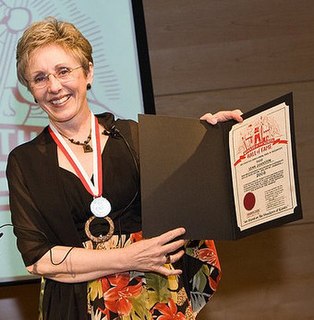A Quote by Mary Wesley
My father was a soldier and my mother was a great mover. She once counted up how many places she had lived in during the first 25 years of her marriage and it came to 20.
Related Quotes
In my earliest of years, my mother was a huge force in my life. She was for all intents and purposes, a single parent. My father had abandoned us. He was an alcoholic and a physical abuser. My mother lived through that tyranny and made her living as a domestic worker. She was uneducated but she brought high principles and decent values into our existence, and she set lofty goals for herself and for her children. We were forever inspired by her strength and by her resistance to racism and to fascism.
The idea of the book ["The Japanese Lover"] came in a conversation that I had with a friend walking in the streets of New York. We were talking about our mothers, and I was telling her how old my mother was, and she was telling me about her mother. Her mother was Jewish, and she said that she was in a retirement home and that she had had a friend for 40 years that was a Japanese gardener. This person had been very important in my friend's upbringing.
When I lost my wife I had a whole different concept of her life. She lived 21 years and people who knew her know it wasn't about the great things she did on this earth. It wasn't that she had money or had popularity, it was that she loved Jesus Christ more than anything else in this world. That was how she related to the world.
As a child, Kate hat once asked her mother how she would know she was in love. Her mother had said she would know she was in love when she would be willing to give up chocolate forever to be with that person for even an hour. Kate, a dedicated and hopeless chocoholic, had decided right then that she would never fall in love. She had been sure that no male was worth such privation.
I think my mother became the muse because she had everything when she was in Hollywood: she had the marriage, the success, the money, all the films she wanted to do and yet even her, she had a longing and wanted to work with a film that had meaning, something more profound. And I think that was very touching to father.
In the classics section, she had picked up a copy of The Magic Mountain and recalled the summer between her junior and senior years of high school, when she read it, how she lay in bed hours after she should have gotten up, the sheet growing warmer against her skin as the sun rose higher in the sky, her mother poking her head in now and then to see if she'd gotten up yet, but never suggesting that she should: Eleanor didn't have many rules about child rearing, but one of them was this: Never interrupt reading.
You had every right to be. He raised his eyes to look at her and she was suddenly and strangely reminded of being four years old at the beach, crying when the wind came up and blew away the castle she had made. Her mother had told her she could make another one if she liked, but it hadn't stopped her crying because what she had thought was permanent was not permanent after all, but only made out of sand that vanished at the touch of wind and water.
Hats change everything. September knew this with all her being, deep in the place where she knew her own name, and that her mother would still love her even though she hadn’t waved goodbye. For one day her father had put on a hat with golden things on it and suddenly he hadn’t been her father anymore, he had been a soldier, and he had left. Hats have power. Hats can change you into someone else.
Her [Eleanor Roosevelt] father was the love of her life. Her father always made her feel wanted, made her feel loved, where her mother made her feel, you know, unloved, judged harshly, never up to par. And she was her father's favorite, and her mother's unfavorite. So her father was the man that she went to for comfort in her imaginings.
At that moment a very good thing was happening to her. Four good things had happened to her, in fact, since she came to Misselthwaite Manor. She had felt as if she had understood a robin and that he had understood her; she had run in the wind until her blood had grown warm; she had been healthily hungry for the first time in her life; and she had found out what it was to be sorry for someone.







































